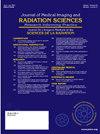Harmonizing Oncology Data: A Pan-Canadian Strategy for Radiotherapy Data Standards
IF 1.3
Q3 RADIOLOGY, NUCLEAR MEDICINE & MEDICAL IMAGING
Journal of Medical Imaging and Radiation Sciences
Pub Date : 2025-05-01
DOI:10.1016/j.jmir.2025.101942
引用次数: 0
Abstract
Purpose/Aim
Since 2018, collaborative international efforts led by the American Association of Physicists in Medicine (AAPM) have provided guidance on radiotherapy-specific (TG-263) and general oncology (Operational Ontology for Oncology—O3) data standards. While standardizing nomenclature offers significant benefits for capturing real-world data, challenges in implementation have revealed gaps between these standards and clinical practice. In response to such challenges, the Canadian Partnership Against Cancer (CPAC) and the Canadian Cancer Society (CCS) launched a Ppan-Canadian Ccancer Ddata Sstrategy in 2023, identifying the radiotherapy (RT) community as well-suited to lead the initial phase of this interprofessional initiative, which aims to make diagnostic and treatment data accessible and linkable.
Methods/Process
As part of CPAC/CCS's strategy to harmonize treatment data, funding was sought to support an early-adopter partnership between two jurisdictions, Ontario (ON) and Nova Scotia (NS), along with two national organizations: the Canadian Artificial Intelligence and Data in Radiotherapy Alliance (CADRA) and the Canadian Partnership for Quality Radiotherapy (CPQR).
Results or Benefits/Challenges
The Pan-Canadian Cancer Data Strategy aims to standardize RT data to enhance system-level decision-making and facilitate data sharing and benchmarking nationwide. CPAC/CCS have empowered CADRA and CPQR to lead this initiative. Formed in 2023 as a committee under the Canadian Organization of Medical Physicists (COMP), CADRA operates as a formally interprofessional initiative, with a mandate to promote best practices in data and artificial intelligence. CADRA's current work includes assessing the feasibility of O3 standards in centres with varied resources and data readiness, focusing initially on the 15 ON RT programs and 2 NS RT sites (under one RT program) as early adopter jurisdictions. Work will contribute to pan-Canadian benchmarking by developing tools such as templates and scripts for centre self-audits. Now integrated as a standing committee within the Canadian Association of Provincial Cancer Agencies (CAPCA), CPQR brings top-down support to facilitate system-level change such as that being led by CADRA, using its established RT network to onboard additional jurisdictions in future phases.
Conclusions/Impact
The pan-Canadian RT data initiative employs a community-of-practice approach, supporting early adopters through CPAC, CADRA, and CPQR guidance. Early insights will inform international efforts, highlighting both challenges and facilitators in implementing RT data standards.
统一肿瘤学数据:泛加拿大放疗数据标准策略
自2018年以来,由美国医学物理学家协会(AAPM)领导的国际合作努力为放射治疗特异性(TG-263)和普通肿瘤学(肿瘤学操作本体- o3)数据标准提供了指导。虽然标准化的命名法为获取真实世界的数据提供了巨大的好处,但实施中的挑战揭示了这些标准与临床实践之间的差距。为了应对这些挑战,加拿大抗癌伙伴关系(CPAC)和加拿大癌症协会(CCS)于2023年启动了ppan - canada癌症数据战略,确定放疗(RT)社区非常适合领导这一跨专业倡议的初始阶段,旨在使诊断和治疗数据可访问和可链接。作为CPAC/CCS协调治疗数据战略的一部分,寻求资金支持安大略省(ON)和新斯科舍省(NS)两个司法管辖区以及两个国家组织:加拿大放射治疗人工智能和数据联盟(CADRA)和加拿大高质量放射治疗伙伴关系(CPQR)之间的早期采用伙伴关系。结果或益处/挑战泛加拿大癌症数据战略旨在标准化RT数据,以增强系统级决策,促进全国范围内的数据共享和基准。CPAC/CCS授权CADRA和CPQR领导这一倡议。CADRA成立于2023年,是加拿大医学物理学家组织(COMP)下属的一个委员会,是一个正式的跨专业倡议,其任务是促进数据和人工智能领域的最佳实践。CADRA目前的工作包括评估O3标准在拥有不同资源和数据准备的中心的可行性,最初的重点是作为早期采用者的15个on RT项目和2个NS RT站点(在一个RT项目下)。通过开发中心自我审计的模板和脚本等工具,工作将有助于建立泛加拿大基准。现在,CPQR作为加拿大省级癌症机构协会(CAPCA)的一个常设委员会,提供自上而下的支持,以促进CADRA领导的系统级变革,并在未来阶段利用其已建立的RT网络加入其他司法管辖区。结论/影响泛加拿大RT数据倡议采用实践社区方法,通过CPAC、CADRA和CPQR指导支持早期采用者。早期的见解将为国际努力提供信息,强调实施RT数据标准的挑战和促进因素。
本文章由计算机程序翻译,如有差异,请以英文原文为准。
求助全文
约1分钟内获得全文
求助全文
来源期刊

Journal of Medical Imaging and Radiation Sciences
RADIOLOGY, NUCLEAR MEDICINE & MEDICAL IMAGING-
CiteScore
2.30
自引率
11.10%
发文量
231
审稿时长
53 days
期刊介绍:
Journal of Medical Imaging and Radiation Sciences is the official peer-reviewed journal of the Canadian Association of Medical Radiation Technologists. This journal is published four times a year and is circulated to approximately 11,000 medical radiation technologists, libraries and radiology departments throughout Canada, the United States and overseas. The Journal publishes articles on recent research, new technology and techniques, professional practices, technologists viewpoints as well as relevant book reviews.
 求助内容:
求助内容: 应助结果提醒方式:
应助结果提醒方式:


